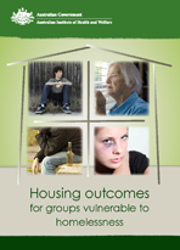Summary
In the 2 and a half years from 1 July 2011 to 31 December 2013, Specialist Homelessness Services (SHS) provided support to over 400,000 people. Some of these clients were at risk of losing their housing and others had already become homeless when they sought support.
This analysis examines the housing outcomes of over 94,000 clients in four groups known to be vulnerable to homelessness: those experiencing domestic and family violence, young people presenting alone, people with problematic drug and alcohol use and those with a current mental health issue. The analysis found that:
- Those who were more socially and economically disadvantaged had poorer housing outcomes across all cohorts. These clients were more likely to be unemployed, had no income or were only on income support, had a past history of homelessness and had more complex presenting issues. Those who had the poorest housing outcomes were those who had problematic drug and alcohol use.
- Specialist Homelessness Services put considerable effort into preventing those most at risk of losing their housing falling into homelessness. Those clients who began support housed but went on to become homeless did so after having almost twice as many median days of support as those who maintained their housing (between 53 and 89 days).
- The majority of clients who were housed on presentation did not become homeless with the support of homelessness services. This was the highest for those with mental health issues (92% retaining housing) and for women experiencing domestic violence (87%).
- It takes considerable support by agencies to assist a person into housing. The group of clients who presented homeless and became housed were supported for the greatest median number of days with between 112 and 175 days of support.
- Many clients who remained homeless appeared less 'housing ready' than other clients. They were less engaged with the service system than those who became housed. They largely sought support for basic needs, had significantly fewer days of support (between 20 and 46 median days) and were less likely to request support for accommodation than those who became housed.



